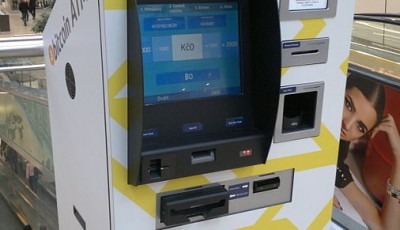An interview with Glidera CEO Dave Ripley on Bitcoin ATMs
Bitcoin ATMs are popping all over the world, with more than 120 such machines having been installed globally, according to the ATM Industry Association, which released a position paper on Bitcoin ATMs in early September.
CoinReport spoke to Dave Ripley, CEO of Chicago-based Glidera, a Bitcoin wallet provider, about the need for Bitcoin ATMs given that the currency itself is not tangible.
Ripley said:
“Most Bitcoin ATMs serve the purpose of conversion between fiat currency (e.g. US dollars, Euros, etc.) and Bitcoin. Though bitcoins are completely digital, US dollars and other fiat currencies are of course still printed as paper bills.
The real question then becomes, what use cases do Bitcoin ATMs serve for converting between bitcoin and paper bills. One worthwhile use case applies to international travelers. A person from could travel from their home country somewhere in Asia for example Malaysia, South Korea, etc., land at the airport in another country (e.g. United States, etc.), visit a Bitcoin ATM and use their Bitcoin wallet to obtain cash in US dollars immediately. In this case, individuals avoid having to worry about their ATM card from their home country bank being incompatible with the ATMs at the airport. Bitcoin is completely globally and compatible anywhere in the world.”
He added Bitcoin ATMs “provide yet another avenue for individuals to more easily obtain bitcoin and interact with the Bitcoin ecosystem. This benefits all businesses, including merchants that accept bitcoin and businesses that directly provide Bitcoin products and services such as Glidera.”
Asked what advantages he sees in Bitcoin ATMs in terms of consumer adoption of the digital currency, Ripley spoke about the benefits for unbanked people, saying:
“There are many people here in the US and globally as well that are locked out of the banking system, frequently due to overbearing bank fees. These ‘unbanked’ individuals often conduct their finances primarily using cash. Bitcoin provides these individuals with a way to actually obtain and use digital money (Bitcoin) without having to deal with the friction and cost of the banking system. These users could leverage Bitcoin ATMs to obtain bitcoin using their cash. Further, many of the individuals that are part of the unbanked population participate in remittance transactions. It’s easy to see how these ATMs could begin to play a role in facilitating remittances.”
As for disadvantages, Ripley said the machines themselves “do not have any inherent disadvantages preventing usage, though there are some tradeoffs for users. Dealing with physical cash does introduce more cost into currency conversions relative to completely digital transactions. Separately, though not necessarily a tradeoff, users should always pay close attention to security anytime they are interacting with any type of financial service and ATMs are no exception.”
CoinReport asked Ripley for his perspective on the ATM Industry Association position paper, which argued that the association does not consider Bitcoin to be a threat to cash or established electronic payment methods, but recommended increased support and supervision of Bitcoin ATMs to ensure they follow security best practices and maintain the ATM industry’s current high levels of consumer trust.
Ripley said:
“In general, the position paper does a decent job of laying out the relevant issues. However, the paper does not attempt to go into a thorough discussion of the issues. For example, the paper mentions that Bitcoin is susceptible to crime and theft. However, Bitcoin can certainly be highly secure when the right security solutions are used, such as the distributed security offered by non-custodial multi-signature wallets. In this sense, Bitcoin can be much less susceptible to theft than the legacy financial system and payments network.”
He added:
“The paper also states that supervision of Bitcoin ATMs should increase to ensure appropriate security. No doubt security is critical for Bitcoin; however, the paper does not layout any rationale to indicate why additional supervision would lead to greater security. The non-custodial technological solutions that are currently emerging in the Bitcoin community have the potential to be far superior to the costly legacy protections suggested in the paper.”
Image courtesy of Glidera













